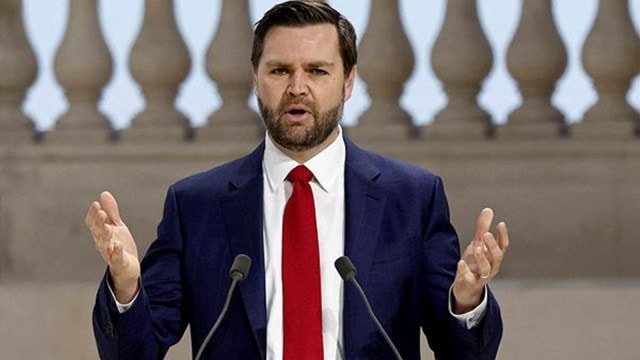

Feb 25, 2025 18:50 IST First published on: Feb 25, 2025 at 18:39 IST
“Turning and turning in the widening gyre/The falcon cannot hear the falconer/Things fall apart; the centre cannot hold; Mere anarchy is loosed upon the world.” Yeats’ words seem to resonate with the breathtaking pace of developments last week that herald the rise of a new era of politics (bear with me as I try to summarise these briefly): It started with the American Vice President J D Vance crossing the diplomatic “red line” by commenting on the domestic affairs of his European allies at Munich. Vance chastised European governments for ignoring those with contradictory political views regarding immigration — a veiled reference to German far-right party Alternative for Germany (AfD). This came on the heels of Elon Musk publicly supporting the party. This was soon followed by a phone call between Trump and Putin, where the two effectively decided to sacrifice Ukraine and sidestep Europe in order to cut a deal, burying in one fell swoop 75 years of the transatlantic consensus on security symbolised by NATO.
As European leaders have historically been the ones side-stepping others when it comes to foreign policy (Africa says hello, by the way), they panicked and rushed to Paris in order to discuss an alternate European security framework, and simultaneously, Keir Starmer and Emmanuel Macron planned rushed trips to Washington in a last-ditch effort to persuade Trump. Meanwhile, in the recently concluded German elections, the conservative CSU/CDU has come back to power, with the far-right AfD in a close second position. In between all of this, Italy’s Prime Minister Giorgia Meloni criticised the left for its hysteria over the rise of conservative politicians worldwide.
Story continues below this ad
The key question is: Is there an actual resurgence of the right, and what does this mean for the future of international politics? The first step is to understand the nature of this politics itself — the traditional left-right binary doesn’t add much to our understanding for it heaps all kinds of politics together, the “left” with the “liberal”, and the “conservative” and the “neo-nationalist”. It is perhaps more accurate to characterise post World War II politics in Western Europe as status-quoist, characterised by a bipartisan consensus on the free-market economy, electoral democracy, and the acceptance of American hegemony/security umbrella under NATO. There were, of course, major differences on issues such as the welfare state, culture, and immigration, but by and large, normal politics meant playing by certain rules of the game, no matter which party came to power. In this context, conservative politics was closer to Michael Oakeshott’s conception– “to be conservative, then, is to prefer the familiar to the unknown, to prefer the tried to the untried”.
While this may seem like a perfect rational sentiment, it also worked within a certain historical context of a post-War Europe stabilised by the Marshall Plan, and one which afforded considerable social security to its citizens (if only to counter the allure of communism emanating from the Soviet Union). However, with the spread of neoliberalism in the 1980s, as states were compelled to free the shackles on capital and undertake austerity, the stability of the post-1945 world began to give way. With the dissolution of the Soviet Union in 1991, the threat of communism also receded, thus allowing capital even more freedom to evade taxation, and decry welfarist measures as economic populism. For a while, things seemed to work — the rise of the Tony Blair/Bill Clinton style of politics heralded the new age of globalisation. However, with rising economic inequality came rising insecurity, as people found themselves on the wrong side of globalisation. This also meant that the older consensus also began to give way — as the status quo “liberal-conservative” politics no longer offered any solutions.
Thus, neo-nationalist parties with extreme right wing agendas (some of them can be called fascist) began to gain a subaltern popularity, away from the glare of the mainstream, and today they can no longer be seen as fringe players. What characterises these parties is not a coherent ideology, but rather, a mix of contrarian positions challenging the status-quo. For instance, Meloni criticises France for its neo-colonial policies in Africa, but has also been quoted praising Mussolini and taking a tough stance on migration. Similarly, Trump’s muted stance on the H1-B controversy is in direct contrast to his anti-globalisation, pro-working class rhetoric. This is coupled with a politics of revisionism, heralding national golden ages, whether it is MAGA or MIGA. This lack of coherence is intentional — the aim is to provide a channel for people’s resentment against conventional politics and the inefficacy of the previous consensus. It also points to a deeper structural malaise that status quo politics cannot transcend – it is now a project that has been exhausted by the very creature that it birthed — neoliberal capitalism. Whether it is the US, UK, or Germany, people have been profoundly dissatisfied with the political options they have on the table.
Story continues below this ad
The shaking up of conventional domestic politics also reverberates on the international level. Thus, the breakdown of the transatlantic consensus has its roots in the withering efficacy of “normal politics” in these countries. As these societies transform, the liberal international order may be witnessing an irreversible, structural decline. But does this also mean that there will be a new global alliance of the right? Not quite, I think. The fundamental difference is that right-wing politics does not have a universal vision, for the nation-state is the highest form of political unity that they aspire to. Thus, unlike liberal politics, which imagines a “global village” of liberal democracies and free markets, or Marxism, which believes in internationalist solidarity between workers, right-wing movements can at best indulge in tactical alliances with each other. Any kind of a closer, material solidarity goes against the very fabric of their politics that is predicated on an irreducible difference between the self and the other. At the same time, what we might see is a different kind of world, where the logic of power reigns supreme under “spheres of influence”.
most read
In the absence of any other universal ethical vision of an international order, the world may thus be looking at a protracted period of parallel orders/disorders. While this may seem bleak, there is an opportunity here — the chance to radically re-imagine politics, and conceive a new universalism. Let us see who takes it.
The writer is an assistant professor of International Relations, Ashoka University. Views are personal


